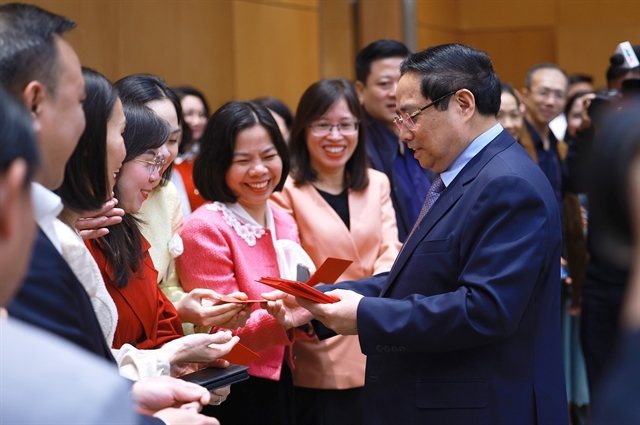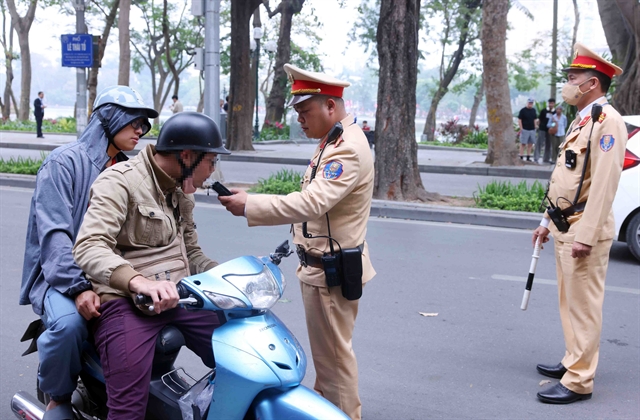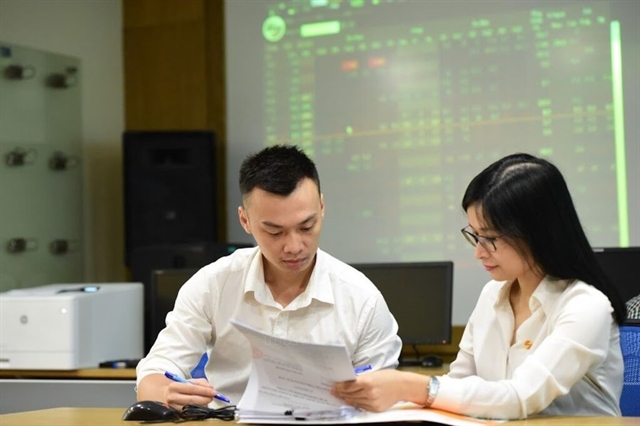 Politics & Law
Politics & Law

 |
| Vietnamese Prime Minister Phạm Minh Chính, Chinese Premier Li Qiang, Republic of Korea's President Yoon Suk Yeol, Japanese Prime Minister Ishiba Shigeru and heads of ASEAN delegations at the ASEAN+3 Summit in Laos on Thursday. — VNA/VNS Photo Dương Giang |
VIENTIANE — Prime Minister Phạm Minh Chính on Thursday attended the 27th ASEAN Plus Three Summit in Vientiane, Laos, along with other heads of ASEAN state members, Chinese Premier Li Qiang, Republic of Korea's President Yoon Suk Yeol, and Japanese Prime Minister Ishiba Shigeru.
Leaders of ASEAN and the three countries - China, Japan, and South Korea - underscored the importance of the ASEAN+3 cooperation framework, appreciating the positive progress made in recent ASEAN+3 cooperation.
The implementation of the ASEAN+3 Cooperation Work Plan for 2023-27 has reached 55 per cent completion, after nearly two years of execution.
According to a report by the ASEAN+3 Macroeconomic Research Office (AMRO), despite numerous uncertainties, the economic growth rate of the ASEAN+3 region is projected to reach 4.2 per cent in 2024 and could hit as high as 4.4 per cent in 2025.
In 2023, the two-way trade between ASEAN and China, Japan and South Korea reached US$1.1 trillion, while total FDI from these countries into ASEAN came at $42.8 billion.
The leaders of ASEAN and its partners agreed to continue coordinating the effective implementation of the work plan, prioritising cooperation in economic, trade and investment areas, and effectively implementing the Regional Comprehensive Economic Partnership (RCEP).
They also stressed the importance of enhancing capacity-building and optimising the existing sectoral cooperation mechanisms to promptly address and tackle non-traditional security challenges, including transnational crime, food security, and healthcare security.
The leaders supported enhancing coordination and ensuring regional financial stability through the Chiang Mai Initiative Multilateralization (CMIM).
They also agreed to strengthen cooperation in innovation, digital transformation, electric vehicles, energy transition, and climate change.
The leaders further stressed promoting people-to-people exchanges and leveraging the role and value of ASEAN+3 to contribute more positively to peace, stability, cooperation, and regional development.
At the summit PM Chính praised the important role of China, Japan and South Korea in maintaining regional stability, peace, cooperation, and development.
He outlined three key directions for the development of ASEAN+3 cooperation in the context of complex and unpredictable regional and global changes.
First, ensuring the connectivity of supply chains. PM Chính welcomed and called for the early implementation of the ASEAN+3 Leaders’ Declaration on Enhancing Regional Supply Chain Connectivity, aiming to promote infrastructure connectivity, facilitate trade and investment, stabilise finance, open markets, and enhance the efficiency of goods and services flow, as well as foster economic connectivity initiatives.
Second, capitalising on new growth drivers. PM Chính stressed the need to harness the potential and opportunities for cooperation in science, technology, innovation, digital transformation, green transition, circular economy and sharing economy, as well as in emerging sectors such as artificial intelligence, semiconductors, cloud computing, and the Internet of Things, bringing tangible benefits to people and countries in the region.
Third, resilience in the face of natural disasters and climate change. Thanking the ASEAN+3 partners for their support in economic recovery in recent years and in mitigating the damage caused by the super typhoon Yagi, PM Chính called for strengthened collaborations in disaster management and damage reduction, enhanced resilience of communities, and a higher priority on cooperation in energy transition, green transformation, environmental protection, and climate change response. PM Chính also expressed hope that the ASEAN+3 partners would further support the sustainable development of the Mekong subregion.
Reaffirming the importance of a peaceful, secure, and stable environment, free from war, conducive to development for all countries and the region, both in Southeast and Northeast Asia, PM Chính stressed that in any situation, the most important factor is to respect international law, the UN Charter, and the 1982 United Nations Convention on the Law of the Sea (UNCLOS), engage in frank dialogue, cooperate sincerely, build mutual trust, respect one another, resolve disputes peacefully, tackle global challenges together, and join hands to shape an open, inclusive, transparent regional architecture, upholding international law, with ASEAN at its centre and the effective support and cooperation of China, Japan, and South Korea. — VNS




